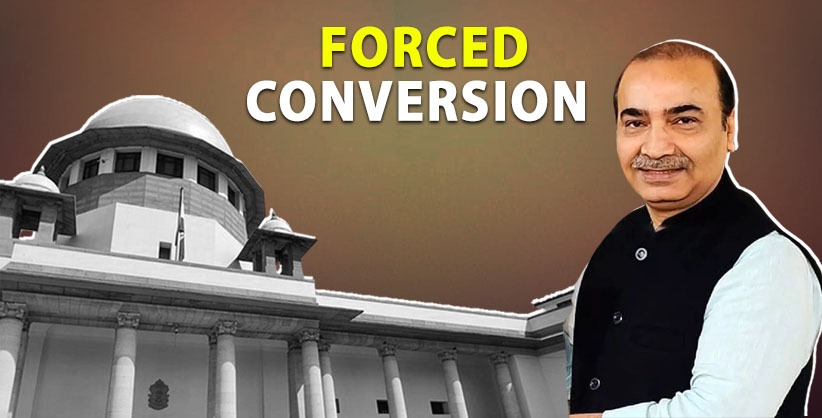NEW DELHI: The Supreme Court on Monday said the issue of forced religious conversion is a "very serious issue" and it may affect the security of the nation and as well as freedom of citizens.
The top court asked the Centre to make its stand clear on what steps can be taken to stop forced conversions.
Hearing a PIL by advocate Ashwini Kumar Upadhyay, a bench of Justices M R Shah and Hima Kohli said, "There is freedom of religion, but no freedom on forced conversion."
Upadhyay sought urgent steps against religious conversion by fraudulent means and by intimidation, threatening, deceivingly luring through gifts and monetary benefits, as it offends Articles 14, 21, and 25 of the Constitution.
"This is such a serious matter. Where is your stand by way of counter? Very serious and sincere efforts are to be made," the bench told Solicitor General Tushar Mehta, appearing for the Centre.
Mehta said there were two laws by Madhya Pradesh and Odisha on forcible religious conversion.
He agreed that people are lured by giving rice and wheat, which is a ground for conversion.
It is rampant in tribal areas, Mehta said, adding that he will file a reply by Monday.
The court asked Mehta to explain what steps have been taken by the Centre.
"Make your stand very clear, what action you propose to take, the bench asked Mehta, while emphasising the Centre must step in to stop such forceful conversion before the situation becomes difficult.
"The issue with alleged conversion of religion, if it found to be true then it affects the security of the nation as well as the freedom of citizen, therefore it is better that Union of India make its stand clear and file a counter on what steps can be taken to curb forced conversions by force, allurement or fraudulent means," the bench said.
The bench fixed the matter for further hearing on November 28.
The court asked the Centre to file its response before November 22.
On September 23, the court had issued notice to the Centre on a PIL, seeking a direction to control fraudulent religious conversion and those carried out by intimidation, threat, deceit, and through gifts and monetary benefits.
The plea claimed that if such conversions were not checked, Hindus would soon become a minority in India.
In the past hearing, Upadhyay contended that women and children are the main target of foreign funded missionaries and conversion mafias, but Centre and state governments have not taken appropriate steps to control religious conversion in spirit of Article 15(3).
"Freedom of religion enshrined in Article 25 is not granted exclusively in respect of one faith, but includes all religions equally, and an individual may properly enjoy it if he practices his right in a manner commensurate with the freedom of persons practicing the other religions. What is liberty for one, in equal measure, is freedom for the other, and therefore, there can be no such thing as a fundamental right to turn another man into one's own religion," it said.
The petitioner has made the Ministry of Home Affairs, Ministry of Law and Justice, CBI, NIA and state governments as respondents in the matter.
The plea contended that Church planting is a process that results in a new (local) church being established and several unethical predatory conversion strategies are commonly used. It added that one method is material enticement in which humanitarian aid or economic, educational, medical or social assistance is offered on the condition that the person converts.
Another is the denigration of the person's religion to make a new religion appear superior. A third unethical, predatory method is the promotion of 'bigotry' i.e. knowingly and intentionally promoting religious hatred & violence. Predatory proselytization tears apart the fabric of the communities where it occurs and has led to the annihilation of cultures," the plea added.
The petitioner claimed the situation is alarming as many individuals and organisations are carrying mass conversions of SC-STs in rural areas for the last two decades.
The plea said that religious conversion by hook and crook and by the carrot and the stick is not the problem of Delhi only but a pan India problem. Therefore, it is the duty of the Centre to take steps to prohibit it nationwide.
Since the penal law does not cover religious conversion, many States have become the safe place for foreign funded individuals, NGOs and missionaries and they have established their offices even in Delhi (Okhla, Jamia Nagar, Batla House, Kali Bari Marg etc).







